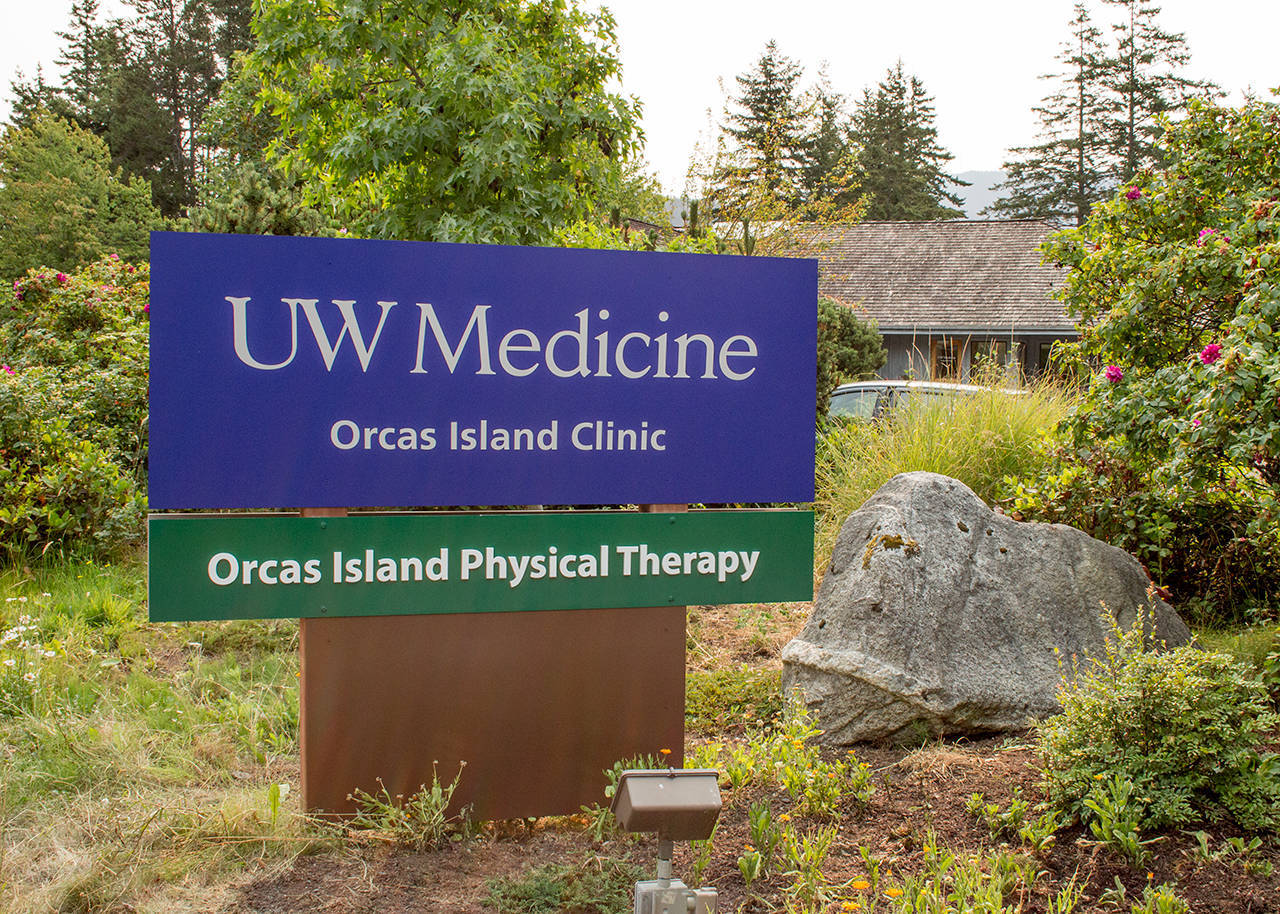It was standing-room only in Orcas Center for a town hall meeting with UW Medicine representatives.
“We are honored and grateful to be invited into the Orcas community,” said Executive Director of Neighborhood Clinics Debra Gussin.
She asked for patience and feedback as UW makes the transition to managing the Orcas Medical Center, starting Sept. 11. This is the first time the organization has set up a facility on an island, and, combined with the tight deadline, Gussin said it was a “big challenge.”
Jay Priebe, director of network operations for UW Medicine, applauded the staff of OMC for sharing knowledge and welcoming the transition with open arms.
Background
In September 2016, Island Hospital chose not to renew its contract with OMC, which had been operating at a deficit. UW Medicine announced its intention to partner with the Orcas Medical Foundation, the nonprofit that owns the clinic building, but $750,000 was needed to cover the transition as well as provide a financial cushion. By the end of 2016, the total amount was raised by island donors. Island Hospital agreed to extend its contract through the summer in order for UW to transfer files and upgrade network systems without a gap in patient care.
Several people at the meeting asked for more transparency from the Orcas Medical Foundation and UW Medicine, specifically in regard to copies of the final contract. Board members said they would have no problem putting those documents online. The new website for OMC will be live by Sept. 11.
What’s next?
From now until early November, physicians from UW Neighborhood Clinics will provide coverage at the Orcas facility. Starting Nov. 1, Dr. Michael D. Alperin will assume his role as a physician and chief of UW Medicine for Orcas Island and Lopez Island Clinics. Dr. David Russell and Kirsten Pickard, ARNP, will join the team as well. Since 2004, Russell has owned and operated Orcas Island Family Medicine, where Pickard also currently works. Russell will be closing down his practice, and says UW is only able to absorb two of his staff members, both of whom go through an interview process.
As part of UW Medicine, patients will have access to its network of specialists and mental health providers either via referral or telehealth (video conferencing) at the clinic. Priebe says an upgrade in on-site equipment will enable results to be sent electronically to specialists for review.
The ultimate goal for the clinic’s operation will be six days a week from 8 a.m. to 6 p.m. In addition to maintaining a working relationship with Orcas emergency services, Gussin says they hope to offer an after-hours virtual-care clinic, 24/7 nurse-care line and community line that would put patients through to an on-call physician. She said the plan is to improve diagnostic care and reduce unnecessary emergency flights off island.
“We know EMS is an important resource here, and we won’t disrupt it,” said Gussin. “Our goal is to continue that partnership.”
Many in the audience also asked about the possiblity of bringing back Dr. Camille Fleming (who left OMC in 2016 to work in Seattle) and Dr. David Shinstrom, who runs Orcas Family Health Center. Gussin and Priebe said hiring additional physicians depends on securing a long-term funding source.
Hospital district
Part of the agreement with OMC and UW is that a community subsidy is required for long-term operations. Gussin said the $750,000 raised by the community “won’t last forever.”
“We need a reliable, sustainable source to operate the clinic,” she said.
In late August, the Coalition for Orcas Health Care announced it will be seeking 300 signatures to put a public hospital district and five commissioner positions on the April 2018 ballot.
Over the past year, coalition members met with local physicians, nurses, health care administrators, the chief of Orcas Island Fire and Rescue and other stakeholders. The concerns all focused on one need: sustainable financial support to shore up the clinics and provide resources to fill gaps in other needed services and programs. They determined the best solution is a public hospital district governed by five elected commissioners who serve six-year terms.
This April, Lopez voters overwhelmingly approved the formation of a hospital district to fund the Lopez Medical Clinic (also now managed by UW Medicine) and elected five commissioners to oversee it. The tax rate will be set after commissioners assess the Lopez Clinic’s financial needs. Tax revenue will be collected starting in April 2018.
If passed on Orcas, a hospital district could be a source of funding for OMC, although commissioners would oversee the district’s operation – not UW. Based on historical data and projections of revenue, the medical foundation estimates a $750,000 yearly shortfall to operate and maintain the Orcas clinic.
“There is $2 billion in assessed property value on Orcas, and the maximum a hospital district can ask for is 75 cents per thousand, so the very most the Orcas district could bring in would be $1.5 million,” said coalition member Art Lange.
Hilary Canty, executive director of the Orcas Island Community Foundation, said, “This is not a new situation, just a new solution,” as local donors have been subsidizing medical care on the island for years.
“The hospital district would just get everyone involved but those who can may still be asked to give,” she said.




